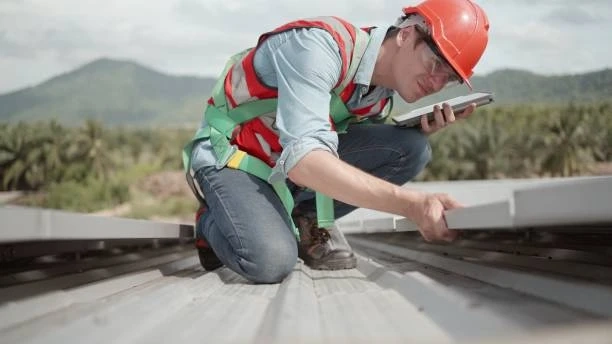When it comes to homeownership, one of the most important, yet often overlooked, components is the roof. Serving as the first line of defense against the elements, a roof needs to be strong, secure, and well-maintained. However, like any other part of your home, roofs wear out over time, and potential problems can arise. This is where roof certification comes into play. A roof certification ensures that your roof is in optimal condition, providing peace of mind for homeowners, especially when buying or selling property. In this article, we will explain what roof certification is, why it’s beneficial, and how it can help protect both your home and your investment.
What is Roof Certification?
A roof certification is a professional evaluation conducted by a licensed roofing contractor. During this evaluation, the contractor inspects the roof to assess its overall condition and performance. The primary purpose of a roof certification is to confirm that the roof is in good working order, free from leaks, structural damage, and other significant problems. Following the inspection, the roofing contractor will issue a certification that declares the roof to be in good condition for a specified period, usually ranging from one to five years.
The certification generally includes details such as the age of the roof, the materials used, any potential issues observed during the inspection, and an estimate of the roof’s remaining lifespan. This document is often required when buying or selling a home, and it can also be helpful for homeowners looking to maintain their roof or make insurance claims.
The Importance of Roof Certification
Roof certification is important for a variety of reasons. Here are some of the key benefits that come with having your roof certified:
1. A Vital Document for Real Estate Transactions
One of the most common situations where roof certification becomes crucial is during the buying or selling of a home. For sellers, a roof certification can be an excellent selling point, as it provides prospective buyers with assurance that the roof is in good condition and won’t need expensive repairs or replacement in the near future. Buyers, on the other hand, can feel more confident knowing that the roof has been thoroughly inspected and certified by a professional, which can help them avoid unforeseen expenses.
In some cases, mortgage lenders will require roof certification before approving a loan, especially if the roof is older or there are concerns about its condition. By having a roof certification, sellers can prevent delays in the closing process and avoid complications with financing.
2. Helps with Insurance Claims and Premiums
Homeowners insurance companies often require roof certifications to ensure that the roof is capable of withstanding the elements and not prone to issues that could lead to a costly claim. For homeowners with an older roof or those living in areas prone to severe weather, a roof certification can help secure insurance coverage at a reasonable price. Many insurers may offer discounted premiums for homes with certified roofs, as the risk of roof failure is lower when the roof is properly maintained.
In the event of a roof-related insurance claim, having a roof certification can make the claims process much smoother. The certification serves as documentation that the roof was in good condition at the time of the inspection, which can help prevent disputes with the insurance company.
3. Prevents Costly Repairs
Roof certification is not only valuable for transactions but also for ongoing roof maintenance. Regular inspections allow you to identify minor issues before they develop into major problems. Small leaks, broken shingles, or deteriorating flashing may not be immediately visible but can lead to significant damage if left unaddressed. By catching these issues early, homeowners can avoid expensive repairs and extend the lifespan of their roof.
Moreover, a roof certification can help homeowners plan for future maintenance or replacement needs. If the roof is nearing the end of its useful life, the certification can provide a timeline for when a roof replacement may be necessary, helping homeowners budget and prepare financially.
4. Peace of Mind
Above all, a roof certification provides peace of mind for homeowners. The roof is the most critical component of the home’s structure, and when it’s in poor condition, it can lead to a host of problems, including water damage, mold, and even structural issues. By having the roof professionally inspected and certified, homeowners can rest assured that their roof is strong and capable of protecting the home. It reduces the likelihood of unexpected roof failures and ensures that the home remains safe and secure.
How Roof Certification Works
The process of obtaining a roof certification is relatively simple and involves a few key steps:
1. Scheduling an Inspection
The first step in obtaining a roof certification is to schedule an inspection with a licensed roofing contractor. Many roofing companies offer roof certification services, and you can typically book an appointment online or by calling the company directly. The contractor will arrange a time to visit your property and perform the necessary inspection.
2. The Roof Inspection
During the inspection, the roofing contractor will evaluate several aspects of the roof, including:
- Roofing Materials: The contractor will inspect shingles, tiles, or other materials for signs of damage or wear. They will also check for missing or damaged pieces.
- Flashing and Seals: Flashing around roof penetrations (such as chimneys, vents, and skylights) will be checked for leaks or deterioration.
- Structural Integrity: The contractor will assess the overall structure of the roof, looking for any sagging, bowing, or other signs of weakness.
- Attic and Insulation: The contractor may inspect the attic for signs of water damage, mold, or inadequate ventilation.
- Gutters and Drainage: Gutters and downspouts will be checked to ensure they are clear of debris and properly directing water away from the home.
3. Certification Issuance
Once the inspection is complete, the contractor will issue a roof certification if the roof is in good condition. This certification will include information such as the roof's age, material, and condition. If the roof is found to have significant issues that require repairs or replacement, the contractor may suggest necessary actions before a certification is issued. After repairs are completed, the roof can be re-inspected and certified.
The Benefits of Roof Certification
Obtaining a roof certification comes with several advantages for homeowners:
1. Increases Property Value
Having a roof certification can boost the value of your property, particularly when selling. Buyers are more likely to be interested in homes with certified roofs, as it reassures them that the roof is in good condition and won’t require immediate repairs. This can make the home more marketable and help it sell faster.
2. Insurance Discounts
As mentioned earlier, some insurance companies offer discounts for homes with certified roofs. The certification indicates that the roof is less likely to experience damage, reducing the insurer's risk and potentially lowering your premiums.
3. Extends Roof Lifespan
By identifying small issues early on, roof certification can help extend the life of your roof. Minor repairs can prevent more significant problems, allowing your roof to continue functioning properly for a longer period. Regular inspections also ensure that the roof remains in top condition, preventing unnecessary wear and tear.
4. Avoids Unexpected Expenses
A roof certification can save you money in the long run by helping you avoid unexpected repairs or replacements. By identifying issues early, homeowners can address them before they become major problems, reducing the risk of costly roof failures.
Conclusion
Roof certification is an essential tool for homeowners who want to ensure that their roof is in good condition and protect their investment. Whether buying or selling a home, obtaining a roof certification provides peace of mind, helps secure better insurance rates, and ensures that your roof remains in optimal condition. Regular inspections and certifications can extend the life of your roof, prevent expensive repairs, and protect your home from the elements. If you haven’t already had your roof certified, consider scheduling an inspection today to ensure your roof is ready to continue providing vital protection for your home.



